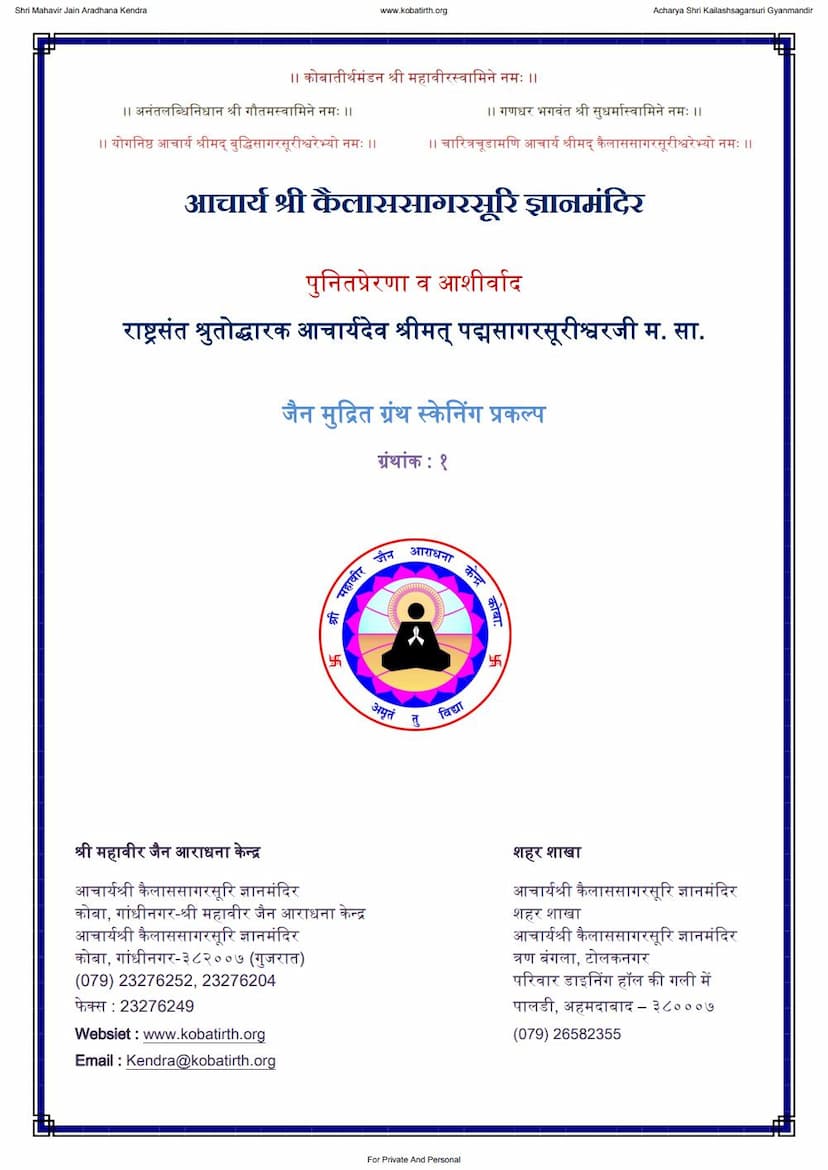Shraman Sutra
Added to library: September 2, 2025

Summary
Based on the provided Jain text "Shraman Sutra" by Amarchand Maharaj, published by Sanmati Gyanpith, here's a comprehensive summary in English:
Book Title: Shraman Sutra Author: Amarchand Maharaj Publisher: Sanmati Gyanpith
Overall Summary:
"Shraman Sutra," authored by Upadhyay Muni Shri Amarchandji Maharaj and published by Sanmati Gyanpith, is a significant Jain religious text that delves deeply into the principles and practices of the Shraman (ascetic) tradition within Jainism. The book aims to provide a comprehensive understanding of the essential practices and philosophical underpinnings for spiritual aspirants, particularly monks and nuns, but also for lay followers seeking spiritual growth.
The text is structured to guide the reader through various aspects of Jain monastic life and conduct. It emphasizes the importance of understanding the core tenets of Jainism, the significance of human life, the pursuit of true happiness, and the path to spiritual liberation. The book systematically breaks down complex concepts into understandable sections, often referencing Jain scriptures and the teachings of revered Acharyas.
Key Themes and Content:
The provided text is extensive, covering a wide range of topics related to Jain spiritual practice. Based on the table of contents and the detailed explanations of various sections, the book can be summarized as follows:
-
The Significance of Human Life and the Goal of Life: The initial chapters (Pages 21-48) emphasize the rarity and preciousness of human birth, highlighting its importance as an opportunity for spiritual liberation. It contrasts human life with other life forms and discusses the ultimate goal of human existence, which is to overcome suffering and attain moksha (liberation).
-
The Pursuit of True Happiness: The text explores the nature of happiness, distinguishing between fleeting worldly pleasures (often termed "sukhabhas" or illusory happiness) and the eternal bliss of the soul. It guides the reader towards finding true, lasting happiness through self-control, detachment, and spiritual practices.
-
The Shraman Dharma and the Layperson's Path (Shravak Dharma): A significant portion of the book is dedicated to explaining the principles of Shraman (monastic) Dharma, the path of renunciation and strict asceticism. It also elucidates the Shravak (layperson's) Dharma, outlining the duties and ethical guidelines for householders who aspire to spiritual progress within their worldly responsibilities. The text clarifies that both paths, though different in practice, lead towards the same ultimate goal.
-
The Core Jain Practices (Aavashyak): The book meticulously details the six essential daily practices (Aavashyak) for Jain ascetics, which are fundamental for spiritual purification and progress. These include:
- Samayik: Equanimity and mental concentration.
- Chaturvishati Stava: Reverence for the 24 Tirthankaras.
- Vandan: Paying obeisance and showing respect.
- Pratikraman: Reviewing and repenting for transgressions.
- Kayotsarg: Renunciation of the body and its sensations.
- Pratyakhyan: Vow of abstinence and renunciation. The author provides detailed explanations, etymologies, and the significance of the sequence of these practices.
-
Detailed Explanation of Sutras and Rituals: The "Shraman Sutra" appears to be a commentary or elucidation of fundamental Jain sutras and daily monastic rituals. The text includes detailed explanations of various sutras like:
- Namaskar Sutra: The universal prayer of salutation.
- Samayik Sutra: The principles of equanimity.
- Mangal Sutra: Auspicious recitations.
- Uttam Sutra: The supreme virtues.
- Sharan Sutra: Taking refuge in the divine.
- Pratikraman Sutra: The detailed process of reviewing and repenting for sins.
- Eryapathika Sutra: Regarding conduct while walking and its implications.
- Shayya Sutra: Rules related to sleeping and bedding.
- Gochari Charya Sutra: Rules for seeking alms (food) with strict adherence to ethical principles.
- Kal Pratilikhana Sutra: Importance of time and timely actions.
- Asanyam Sutra: The nature of lack of self-control.
- Bandhan Sutra: The bonds that tie the soul.
- Dand Sutra: The consequences of actions.
- Gupti Sutra: The control of mind, speech, and body.
- Shalya Sutra: The "thorns" of attachment, aversion, and delusion.
- Gaurav Sutra: The pride associated with spiritual attainments.
- Viradhana Sutra: The transgression of vows and principles.
- Kashaya Sutra: The four passions (anger, pride, delusion, greed).
- Samjna Sutra: The basic drives (food, fear, sex, possession).
- Vikatha Sutra: Idle talk and gossip.
- Dhyana Sutra: Meditation and its types.
- Kriya Sutra: Actions and their consequences.
- Kam Guna Sutra: The objects of the senses.
- Mahavrata Sutra: The five great vows.
- Samiti Sutra: The five careful activities.
- Jivanikaya Sutra: The classification of life forms.
- Lesya Sutra: The subtle states of consciousness.
- Bhayaadi Sutra: Discusses fears, prides, vows, conduct, and other spiritual principles.
- Upa-samhita Sutras: Covering various additional topics.
-
Philosophical Depth and Ethical Guidance: The book delves into the philosophical nuances of Jainism, explaining concepts like karma, soul, liberation, non-violence (Ahimsa), non-absolutism (Syadvada), and the path to spiritual purity. It provides ethical guidance for righteous living, emphasizing self-discipline, mindfulness, and compassion.
-
Author's Humility and Dedication: The text reflects the author's deep reverence for Jain tradition and his humility in presenting this work. It is dedicated to the memory of respected figures within the Jain community and expresses gratitude for the support received. The author also acknowledges the challenges faced during the publication, including health issues and the need for meticulous accuracy.
-
Scholarly Approach: The author, Amarchand Maharaj, a disciple of Acharya Shri Prithichandji Maharaj, demonstrates a profound understanding of Jain Agamas and the works of previous Acharyas. He cites various influential scholars and texts, including those of Acharya Bhadrabahu, Acharya Haribhadra, Acharya Jinasena, Pandit Sukhlalji, and Shri Bherudanji Sethia, indicating a strong foundation in Jain scholarship.
In essence, "Shraman Sutra" is a profound and detailed guide for spiritual seekers, particularly ascetics, offering a systematic and scholarly exposition of Jain monastic conduct, ethics, and philosophy, aimed at fostering spiritual purity and guiding individuals towards ultimate liberation.